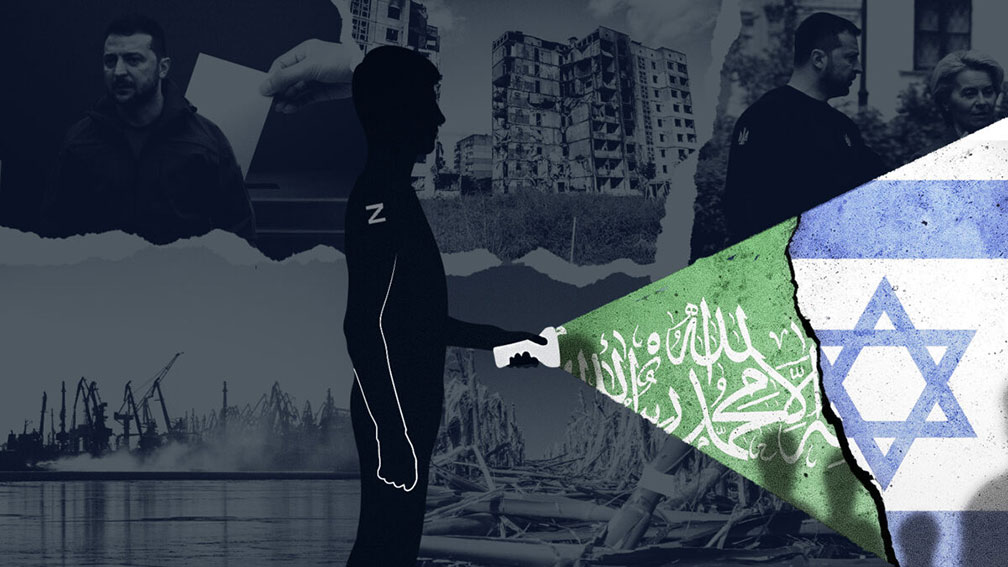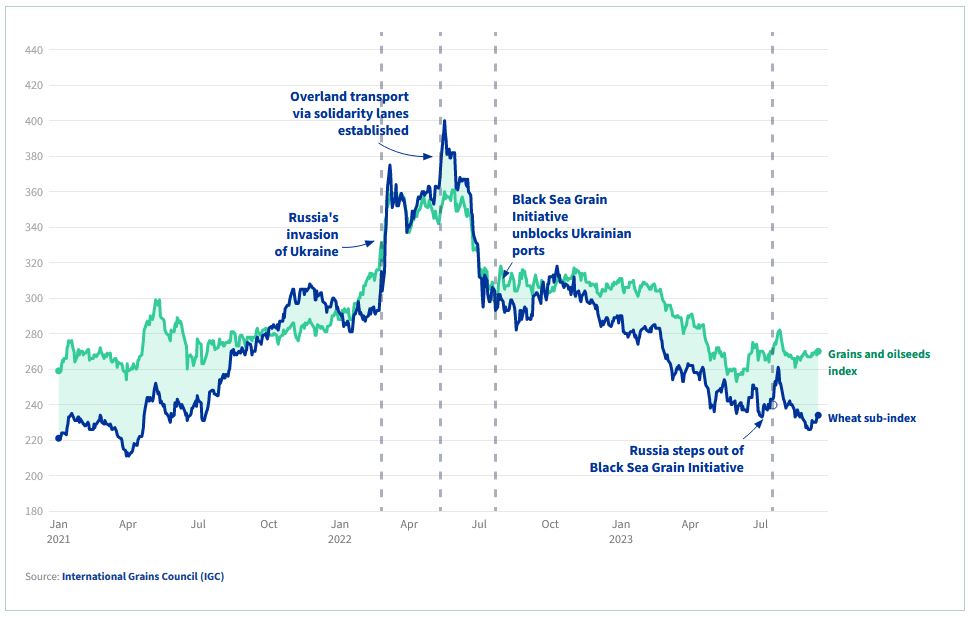Pro-Kremlin outlets try to turn the main focus onto the Israel-Hamas war while talking up ‘Ukraine fatigue in the West’. They are almost silent about Russia’s atrocious bombardments in Ukraine, Black Sea grain issues, and Nagorno-Karabakh…
Source — EUvsDiSiNFO — November 09, 2023 —
Table of Contents
Russian state outlets have a years-long propensity to focus on how bad the situation is outside Russia, apparently wanting to inoculate Russian society against inspiration from liberal democracies. Now, as the new reality of a protracted war against Ukraine is sinking in throughout Russia, every outside crisis is welcome. No wonder, then, that the Israel-Hamas war and its wider implications are taking centre stage for Moscow’s media machine.

We follow how Russia seeks to portray itself as a humanitarian helper while Hamas was received in Moscow and is courted by Russian state channels targeting global audiences especially in Africa, the Middle East, and Latin America.
… and now to Gaza
The narrative is now that the conflict in Gaza will consume all the West’s political and military attention and that the UN cannot react due to Western obstruction. This is coupled with the well-known dystopic forecast of the imminent collapse of the West. According to Putin, this long-predicted collapse will be due to the West’s mishandling of the Israel-Hamas war and problems concerning the wider Middle East.
This ‘collapse’ narrative is a classic. It was promoted during the COVID-19 pandemic and again during the autumn and winter of 2022. Then, it asserted that a devastating energy crisis across Europe would lead to economic chaos, political unrest, demonstrations, and the eventual downfall of corrupt European leaders. So far, none of this has happened, but Kremlin voices are yet again warming up to repeat the song.
Fade it out
At the same time, it is remarkable, but not surprising, how quickly other topics have faded from attention. Earlier, the pro-Kremlin info-sphere provided almost wall-to-wall coverage of missile attacks on Ukraine, always insisting that the strikes hit only military targets. Even if near-real-time footage on social media documented that the missiles hit civilian targets, Moscow would fiercely insist otherwise. A standard news broadcast on a Russian state outlet would typically devote no less than half its time to boasting about the ‘special military operation’.
Silence it
There is less coverage now, even if Russian missile and drone attacks on Ukrainian infrastructure, harbours, and civilian targets continue at a very high rate and heavy fighting involves many large Russian units. Now the attacks have become just an everyday, grinding occurrence.
Pro-Kremlin outlets also offered only silence about Black Sea grain export issues. Before, coverage featured the Black Sea Grain Initiative (BSGI) prominently. But since Russia torpedoed the deal brokered by the UN and Türkiye, there has been less Kremlin talk. The fact remains that the EU Solidarity lanes, routes created by the EU to help Ukraine export its agricultural products among others, and the BSGI notably contributed to lowering grain prices. Perhaps it annoys Russia, another large grain exporter, to see some its excess profit reduced. On the Ukrainian side: between March 2022 and October 2023, over 57 million tonnes of grain, oilseeds, and related products have left Ukraine through the Solidarity Lanes. They enabled the export of around 60% of Ukraine’s grain since the start of the full-scale war. 40% of Ukrainian grain has been exported via the BSGI. See more in this Explainer infographic.

Perhaps it is more difficult for Kremlin spin doctors to promote to domestic and external audiences the blunt reality that Russia is simply trying to destroy as much of Ukraine as possible, ruin its economy, abduct its children, break its public’s morale, and kill its people.
Work up a split in Kyiv
While some topics fade, pro-Kremlin outlets always look for cracks in Kyiv. They paid close attention to an interview in The Economist with Ukrainian Commander-in-Chief General Zaluzhnyi on the need for a breakthrough on the frontlines and statements by President Zelenskyy in Time Magazine. The comments were taken as proof of Ukraine’s collapsing combat capability and a split in the ranks of the enemy which was worked up to the maximum.
In the background of this alleged split, commentators on Russia’s leading state TV channel, Channel One, claimed that US President Joe Biden is merely prolonging the life of the Kyiv regime. With his political battles in Washington, Biden himself is going to the bottom.
Russian state TV tried to drown out coverage of European Commission President Ursula von der Leyen’s visit to Kyiv on 4 November with claims that the positions of Hungary, Slovakia, and Poland undermine the EU’s unconditional support for Ukraine. In addition, Zelenskyy is regularly portrayed as wanting to stay in power and exhibiting despotic arrogance for keeping the war going and postponing elections in Ukraine. It’s the same old Kremlin recipe: undermine popular leaders and forecast collapse.

Also on our Disinfo radar
Did we mention that the Nagorno-Karabakh conflict and the exodus of ethnic Armenians is hardly mentioned in the Kremlin news flow and there is silence about the less-than-glorious role of the Russian military contingent that stood by during their flight? This is how the Temnik works. The Temnik is the system of political instructions from the Kremlin to the main Russian news outlets describing how to spin events, what to highlight, and what to suppress. Throwing accusations against the EU observer mission for alleged clandestine intelligence gathering is merely an attempt to deflect attention. Nice try, but from the very beginning, this exclusively civilian mission has been fully transparent about its plans to operate from six hubs. Moscow cannot hide its frustration with a reduced role in the Southern Caucasus. So it blames Armenian Prime Minister Pashinyan for being a Western tool.
- Western weapons are sold by Ukrainians on the darknet and end up with Hamas or radical groups in the Middle East
This has become a recurrent Kremlin trope designed to sow distrust and doubt about deliveries of weapons to Kyiv. Especially toxic to audiences in the US, these claims try to build an impression of a large-scale, structured network by Ukrainian authorities resembling a drug cartel. It seems more relevant to look to Russia itself, or Iran, or other ideological affiliates to find the origins of the Hamas arsenal.
You may not believe it, but this was actually said by Russian Foreign Minister Lavrov during his 8 November engagement with foreign ambassadors in Moscow. We can now add this horrific claim to our examination of the classic Kremlin tactic of spreading lies like a fog around especially sensitive issues. The spree of lies is designed to confuse the public and constantly sow doubt about the basic fact that Russian forces committed atrocities killing more than 400 civilians in Bucha outside Kyiv during their control of the area in spring 2022. See the broader catalogue of lies about Bucha here.










